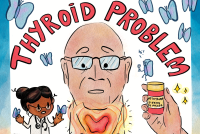Latest KFF Health News Stories
Explosive DeSantis-Newsom Debate Reflects Nation’s Culture Wars
The two governors exchanged heated verbal barbs when they faced off in a wide-ranging debate that covered various health-related topics, from abortion to gun violence.
What the Health? From KFF Health News: Trump Puts Obamacare Repeal Back on Agenda
Although Republicans have never united behind a replacement for the Affordable Care Act, 2024 GOP presidential front-runner Donald Trump said this week he wants to put the issue back on the national agenda. That delights Democrats, who have won at least two elections partly by defending the now-popular health law. Meanwhile, the Texas Supreme Court takes up a case brought by women who say their pregnancy complications further endangered their health due to the vagueness of Texas’ near-total ban on abortions. Joanne Kenen of Johns Hopkins University and Politico Magazine, Sarah Karlin-Smith of the Pink Sheet, and Victoria Knight of Axios News join KFF Health News chief Washington correspondent Julie Rovner to discuss these issues and more. Also this week, Rovner interviews KFF Health News’ Rachana Pradhan, who reported and wrote the latest “Bill of the Month” feature.
DeSantis, Newsom to Tangle Over Hot-Button Health Issues
Florida’s Republican presidential hopeful, Ron DeSantis,and Democratic firebrand Gavin Newsom of California square off today in a contest of governors that can best be described as the debate to determine ¿quién es más macho? — who is more manly — about protecting your freedoms. Both men have led their respective states since 2019, and they’ve […]
El altísimo costo de tener una enfermedad autoinmune en Estados Unidos
A pesar de ser muy frecuentes, encontrar ayuda para muchas enfermedades autoinmunes puede resultar frustrante y costoso.
Many Autoimmune Disease Patients Struggle With Diagnosis, Costs, Inattentive Care
Despite the prevalence of autoimmune conditions, like the thyroid disease Hashimoto’s, sometimes finding help can prove frustrating as well as expensive. There are often no definitive diagnostic tests, so patients may rack up big bills as they search for confirmation of their condition and for treatment options.
Progressive and Anti-Abortion? New Group Plays Fast and Loose to Make Points
Progressive Anti-Abortion Uprising, which operates mostly in the nation’s capital, is part of a confrontational anti-abortion movement that embraces all types of media — graffiti, social media, and livestreams — to communicate a smashmouth message.
How the Thyroid Gland Mystifies Doctors and Patients
This illustrated report has been adapted from a KFF Health News article, “Many Autoimmune Disease Patients Struggle With Diagnosis, Costs, Inattentive Care” by Andy Miller, with artwork by Oona Tempest.
What Would a DeSantis Presidency Look Like for Health Care?
Ron DeSantis’ record as Florida governor provides some clues to how he would change the health care landscape if elected president. In his five years as governor, DeSantis has promoted stricter abortion rules and emphasized individual freedom over the benefits of public health.
Backlash to Affirmative Action Hits Pioneering Maternal Health Program for Black Women
A San Francisco program offers a $1,000-a-month stipend for pregnant Black and Pacific Islander women, part of an effort to address severe racial disparities in maternal health. But conservative groups have sued to shut down the Abundant Birth Project, part of a national backlash against affirmative action in health care.
Out for Blood? For Routine Lab Work, the Hospital Billed Her $2,400
Convenient as it may be, beware of getting your blood drawn at a hospital. The cost could be much higher than at an independent lab, and your insurance might not cover it all.
Biden Administration Nibbles at the Maternal Health Crisis
Choosing where to give birth typically comes down to what hospital is most convenient to your home, where your obstetrician practices and your insurance company’s provider network. Now, the Biden administration has given expectant parents another factor to consider: whether their hospital has won the government’s new “birthing friendly” designation. But don’t worry — a […]
Most States Ban Shackling Pregnant Women in Custody, Yet Many Report Being Restrained
Advocates for pregnant people in police custody say repeated incidents show prohibitions on handcuffs and other restraints are little more than lip service.
What the Health? From KFF Health News: Congress Kicks the (Budget) Can Down the Road. Again.
Congress narrowly avoided a federal government shutdown for the second time in six weeks, as Democrats came to the rescue of divided House Republicans over annual spending bills that were supposed to be finished by Oct. 1. But the brinksmanship is likely to repeat itself early in 2024, when the next temporary spending patches expire. Meanwhile, a pair of investigations unveiled this week demonstrate how difficult it still is for seniors to get needed long-term and rehabilitation care. Alice Miranda Ollstein of Politico, Rachel Cohrs of Stat, and Joanne Kenen of Johns Hopkins University and Politico Magazine join KFF Health News’ Julie Rovner to discuss these issues and more.
Abortion “Until the Day of Birth” Is Almost Never a Thing
It’s one of the most frequent claims made by antiabortion lawmakers: That abortion rights supporters favor allowing abortions literally until the end of pregnancy. “Frankly I think it’s unethical and immoral to allow for abortions up until the day of birth,” Sen. Tim Scott (R-S.C.) said at last week’s GOP presidential primary debate. At that […]
What the Health? From KFF Health News: A Very Good Night for Abortion Rights Backers
Abortion rights backers won major victories in at least five states in the 2023 off-year elections Nov. 7, proving the staying power of abortion as a political issue in the wake of the Supreme Court’s 2022 decision overturning Roe v. Wade. Meanwhile, the National Institutes of Health finally has a new director, after Democrats temporarily blocked President Joe Biden’s nominee over a mostly unrelated fight about prescription drug prices. Alice Miranda Ollstein of Politico, Tami Luhby of CNN, and Sandhya Raman of CQ Roll Call join KFF Health News’ Julie Rovner to discuss these issues and more. Also this week, Rovner interviews KFF Health News’ Julie Appleby, who reported and wrote the latest “Bill of the Month” feature.
Another GOP Primary Debate … Another Night of Verbal Clashes
In a faceoff that took some strange turns, five presidential hopefuls focused on foreign affairs and inflation but still revealed the party’s political struggles over its abortion position. Once again, former President Donald Trump did not appear on the debate stage.
Ohio votó a favor del aborto. Podrían seguir otros 11 estados el próximo año
El impulso para llevar el polémico tema a los votantes llega después de la serie de victorias en las votaciones del año pasado a favor del derecho al aborto en seis estados: California, Kansas, Kentucky, Michigan, Montana y Vermont.
Ohio Voted on Abortion. Next Year, 11 More States Might, Too.
Ohio is the latest state where voters have directly weighed in on abortion, and the next wave of such ballot measures is in the works in at least 11 other states, including Missouri.
Ohio Votes on Abortion Rights Today. Eleven States May Follow in 2024.
Voters in Ohio are deciding whether to add abortion rights protections to the state’s constitution today. The vote comes on the heels of last year’s string of ballot measure wins for abortion rights in six states: California, Kansas, Kentucky, Michigan, Montana and Vermont. But this is just the start. Next year, 11 more states could see abortion-related […]
Iowa’s Governor Opposes Abortion — And Has Final Say on Whether Medicaid Pays for It
The federal government requires state Medicaid programs to pay for abortions in limited circumstances, but Iowa hasn’t done so for years. No providers seek Medicaid payments, which require the approval of the governor, an anti-abortion Republican.



















